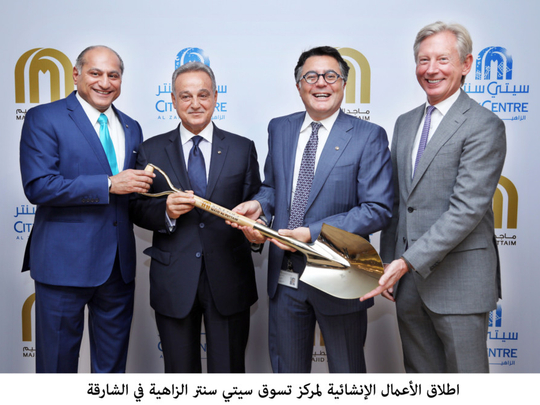
Dubai: Majid Al Futtaim has broken ground on its latest project, the City Centre Al Zahia mall, which will be located in Sharjah.
Occupying 360,837 square metres of built up area within the master planned Al Zahia community, the new mall is being developed by Sharjah Holding, a partnership between the Government of Sharjah and Majid Al Futtaim Properties.
It is expected to open in 2020, and will serve a trade area of more than 1.9 million people by that time, according to a Majid Al Futtaim statement.
City Centre Al Zahia is expected to offer a mix of over 360 retail brands, anchored by a 15,100 square metre Carrefour Hypermarket, in addition to leisure options including VOX Cinemas, and a 2,350 square metre Magic Planet offering.
While the new mall was the news of the day, most journalists at the ground breaking ceremony focused on what the upcoming value added tax (VAT) could mean for mall developers.
Gaith Shocair, Chief Executive Officer for shopping malls at Majid Al Futtaim Properties, said that the impact of value added tax (VAT) was “of course top of mind for everyone,” but that its impact would not be severe.
“What happens when VAT is introduced is that there’s a short term impact as people begin to absorb VAT in their pockets, and then it normalises,” Shocair said.
He went on to point out that the VAT regime that has been proposed will not be as impactful as other countries, making the transition easier.
“This regime we’re talking about is still at the 5 per cent rate, so it’s not at a level that is going to impact consumers like you would see in other economies where it is at 15 per cent, or 20 per cent,” Shocair said.
Continuing on the topic of VAT, Shocair noted that it was important to understand how the regime would be implemented with respect to foreign tourists.
“The indications are that there will be rebates available, much like any VAT regime elsewhere, so that shouldn’t impact visitors to the emirates,” he said.
Shocair stressed again the proposed rate level of VAT, which he described as “very manageable.”
“We’ll have to wait and see how it’s absorbed. Whether it’s through retailer pricing, or shared with consumers,” he said.
The CEO said that he hadn’t received any requests from his tenants to amend the terms of their commercial leases, seeking to share the cost of VAT with their landlord.
“The short answer is no. We haven’t received those kinds of signals or demands,” he said.
Taking a philosophical approach to the issue of oversupply and a potential decline in rental rates, Shocair was sanguine as he remarked that in a free market, there would be winners and losers.
For the losers, he said it would be “hard times.”
“We have to wait and see if the market can absorb the kind of supply that comes in. The more important thing than the amount of supply, is when that supply comes in,” Shocair said.
Shocair added that the retail market in the UAE was a case of “survival of the fittest.”











